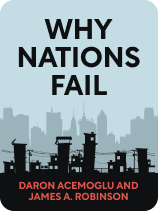

This article is an excerpt from the Shortform book guide to "Why Nations Fail" by Daron Acemoglu and James A. Robinson. Shortform has the world's best summaries and analyses of books you should be reading.
Like this article? Sign up for a free trial here.
Want an overview of the Why Nations Fail book? What are the book’s key ideas and takeaways?
In the book Why Nations Fail, economist Daron Acemoglu and political scientist James A. Robinson try to answer why some nations have wealth and high standards of living while others struggle with poverty and instability. They argue that the answer to this question has to do with freedom and fairness in a nation’s economy and government.
Keep reading for an overview of the Why Nations Fail book by Acemoglu and Robinson.
Why Nations Fail: Book Overview
Published in 2012, the Why Nations Fail book by economist Daron Acemoglu and political scientist James A. Robinson creates a theory to explain international inequality: why some nations “fail” and are poor, unstable, and have low standards of living, while others “succeed” and are wealthy, stable, and have high standards of living. The authors argue that successful nations have political and economic institutions that are “open,” or free, fair, and accessible to society at large. On the other hand, failing nations have political and economic institutions that are “exclusive,” or that exploit average citizens to benefit a few powerful elites.
The Why Nations Fail book’s main theory of international inequality can be broken down into four parts:
- Part 1: Flawed Theories of International Inequality explains existing theories on international inequality and why they don’t work.
- Part 2: Why Nations Succeed defines open institutions and explains how they help nations succeed.
- Part 3: Why Nations Fail defines exclusive institutions and explains how they cause nations to fail.
- Part 4: Why Nations Change outlines how exclusive institutions can become open and vice versa.
| The Context of Why Nations Fail Acemoglu and Robinson published Why Nations Fail in 2012, when the global political landscape looked much different than it did just a few years later. The book was published in the middle of the Arab Spring, a series of pro-democracy protests in Middle Eastern and North African nations like Tunisia, Libya, and Egypt. In its 2012 report, nonprofit Freedom House classified 87 nations as “free,” 60 nations as “partly free,” and 48 nations as “not free.” This is the context in which Acemoglu and Robinson wrote Why Nations Fail—a book that argues that liberal democracy is the most stable and economically viable form of government. In the years since the book’s release, there’s been a trend of authoritarian nations growing more powerful and democracies becoming partially, or entirely, authoritarian. In its 2022 report, Freedom House classified 83 nations as “free,” 56 nations as “partially free,” and 56 nations as “not free.” At the same time, there is increasing interest in the subject of why nations fail. Unlike Acemoglu and Robinson’s book, though, more recent works exploring this subject—such as How Democracies Die—tend to focus on the instability of liberal democracy and how nations become authoritarian. |
Part 1: Flawed Theories of International Inequality
Acemoglu and Robinson begin by exploring discussions of international inequality, which aim to explain why some nations succeed while others fail. They use the following standards for success and failure:
- Successful nations are wealthy with high standards of living and relative economic and political stability.
- Failing nations are poor with low standards of living and a great deal of economic and political instability. A nation doesn’t have to collapse entirely to count as failing, but many failing nations do end up descending into chaos and anarchy.
(Shortform note: Some economists and activists argue for a definition of success that focuses less on wealth and more on health and happiness. They note that wealth and happiness don’t always correlate—nations like Bhutan and Costa Rica rank highly in terms of well-being and happiness despite not being exceptionally wealthy. As you read through this article, consider how Acemoglu and Robinson’s definition of success influences their theory.)
Part 2: Why Nations Succeed
After the Why Nations Fail book explains why existing theories on inequality are flawed, the authors then outline their own theory for why the two Koreas—and nations across the world—are unequal. They believe that to understand inequality, one must study a nation’s political and economic institutions:
- Political institutions determine how a nation creates the rules that citizens live under. They also determine who wields power in society and how they wield it. Examples of open political institutions include a system of free and fair elections, town halls, courts, and legislatures.
- Economic institutions are the laws and incentives that influence how people behave in the market for labor, goods, and services. They determine the processes that distribute resources. Examples of economic institutions include banks, the stock market, and patent laws.
Political institutions necessarily determine economic institutions, argue the authors. This is because political institutions determine how rules are made—including the rules that govern economic institutions.
(Shortform note: The relationship between political and economic institutions is the subject of a long-running debate. Some, like Acemoglu and Robinson, argue that political institutions mainly influence economic institutions. Other scholars, however, suggest that economic institutions mainly influence political ones—for example, one scholar argues that the lifespan of a democracy depends on its per-capita income, where higher per-capita income leads to longer-lasting (or even indefinitely-lasting) democratic governments. As you read through the discussions of political and economic institutions below, consider the following question: Does one influence the other more?)
Acemoglu and Robinson argue that inequality comes from different levels of institutional “openness”: freedom for citizens to participate in these political and economic institutions. More open nations succeed, while less open nations fail.
Part 3: Why Nations Fail
In addition to describing nations that succeed through openness, the Why Nations Fail book also explores nations that “fail,” or that are poor and unstable with low quality of life. According to the authors, nations fail due to political and economic institutions that are “exclusive” rather than open. These exclusive institutions enrich and empower a select group of elites at the expense of the population at large.
(Shortform note: Some scholars suggest that authoritarian (and therefore exclusive) regimes will sometimes empower themselves by benefitting the population at large. Though these regimes still repress dissent, they may not fully meet Acemoglu and Robinson’s definition of “failing”: widespread poverty and low quality of life. From this perspective, exclusive leaders will provide wealth, benefits, or quality of life improvements to the population at large to coerce them into submission. For example, while Fidel Castro’s Cuba both repressed dissent and faced major economic hardships, it also created one of the world’s best healthcare systems.)
Exclusive Political Institutions
Acemoglu and Robinson explain that for a political institution to be exclusive, it must meet one of the following two standards:
1) Non-pluralistic: Unlike pluralistic institutions described above, non-pluralistic institutions don’t allow the population at large to exercise political power and don’t create limits on government power. Therefore, non-pluralistic institutions are exclusive by definition: They empower a few elites (the government and wealthy individuals) at the expense of the population at large, who can’t exercise political power or hold their government accountable.
2) Lack of enforcement: Even if a nation has pluralistic institutions, it can still be exclusive if it doesn’t have the power to enforce basic rules of conduct on the elite. Without this power, there’s nothing to limit government power or hold politicians accountable. In this situation, those in power can simply ignore the rules at the expense of the people—meaning that, in practical terms, the nation has exclusive political institutions.
Part 4: Why Nations Change
After outlining how institutions can lead a nation to succeed or fail, the Why Nations Fail book then explains why nations change—how exclusive nations can become open and how open nations can become exclusive.
Acemoglu and Robinson suggest that there are two main ways that nations can fundamentally change their institutions:
1) Critical moments: Nations can change as a result of “critical moments,” or historical events that threaten economic and political upheaval. Such upheaval challenges a nation’s status quo and creates opportunities for the redistribution of wealth and power. Then, whoever gains wealth and power from this redistribution can use it to impact political and economic change. For example, the coronavirus pandemic is causing major political and economic upheaval and redistributing wealth and power—from the growth of anti-vaccination movements to “the great resignation,” where many workers quit or changed their jobs to try and improve their economic circumstances.
(Shortform note: Some historians warn against viewing history as a series of “turning points.” They suggest that to understand historical change, scholars must consider the gradual change over time that contributes to it. Otherwise, they’ll reach reductive conclusions that fail to explain the complex nature of history. Consider Francis Fukuyama’s The End of History and the Last Man: Published in 1992, the book argues that the collapse of the Soviet Union was a turning point—the moment where liberal democracy “won” and became the global ideology forevermore. Critics argue that this kind of conclusion—one that has proven completely false—is the result of “turning point” based thinking.)
2) Gradual shifts: As opposed to critical moments, “gradual shifts” are small institutional changes that happen over the course of decades or even centuries. Acemoglu and Robinson suggest that, at their birth, all nations make initial institutional choices to fit their specific circumstances. Over time, even the smallest of these choices can evolve and have a major impact on the nation’s political and economic institutions.
For example, a new nation’s population is very spread out. As a result, the government decides to schedule regular meetings where people can gather to learn about new laws, taxes, or government decisions. These regular meetings (a political institution) help the population know what their government is up to, so they can hold their government more accountable to its promises or decisions. During the meetings, people begin to debate new government decisions—and eventually, they start to settle disagreements by voting. What started out as a small choice made to solve a specific problem (informing a spread-out population about new laws and taxes) caused a gradual shift toward open political institutions.
(Shortform note: This gradual and shifting type of change helps to inform the Why Nations Fail book’s argument that nations like the United Kingdom or the United States had open institutions, despite having legal slavery, a colonial empire, and greatly restricted voting rights. The authors explain that the US and UK weren’t ideals of openness but were simply more open than many other nations at the time. From the perspective of gradual shifts, it was due to this partial openness that these nations’ institutions could then expand over time to more freely and fairly distribute political and economic power to the population at large.)

———End of Preview———
Like what you just read? Read the rest of the world's best book summary and analysis of Daron Acemoglu and James A. Robinson's "Why Nations Fail" at Shortform.
Here's what you'll find in our full Why Nations Fail summary:
- Why some nations have wealth while others struggle with poverty
- Why open nations thrive and exclusive nations typically fail
- How and why some nations change over time






